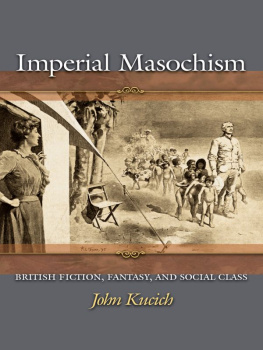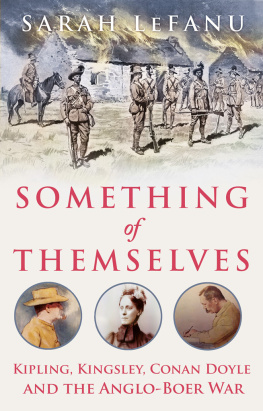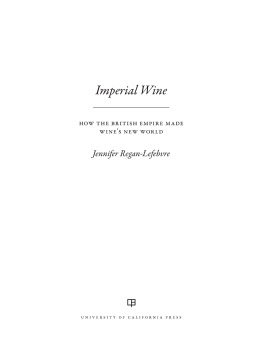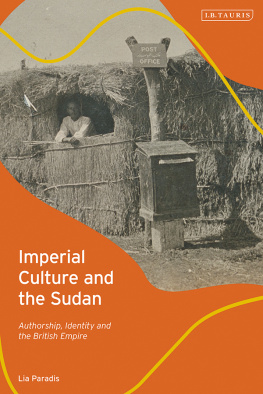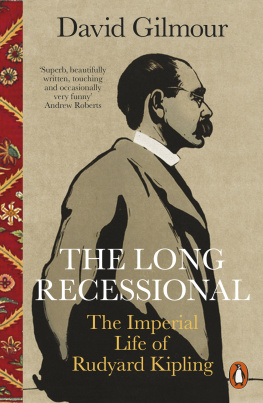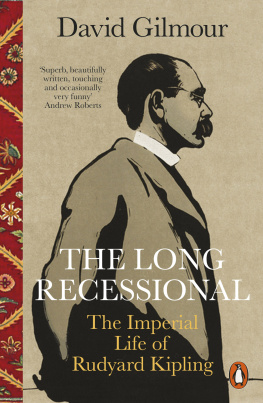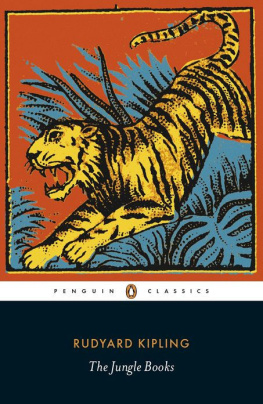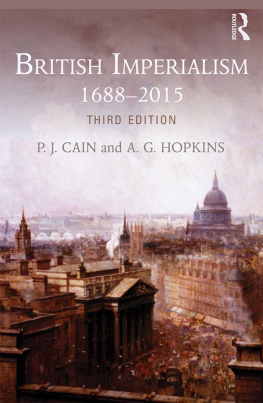Imperial Masochism

Imperial Masochism

BRITISH FICTION, FANTASY,
AND SOCIAL CLASS
John Kucich
PRINCETON UNIVERSITY PRESS
PRINCETON AND OXFORD
Copyright 2007 by Princeton University Press
Published by Princeton University Press, 41 William Street, Princeton, New Jersey 08540
In the United Kingdom: Princeton University Press, 3 Market Place, Woodstock,
Oxfordshire OX20 1SY
ALL RIGHTS RESERVED
Library of Congress Cataloging-in-Publication Data
Kucich, John.
Imperial masochism : British fiction, fantasy, and social class / John Kucich.
p. cm.
Includes bibliographical references and index.
eISBN: 978-1-40082-740-4
1. English fiction19th centuryHistory and criticism. 2. Masochism in literature.
3. Social classes in literature. 4. Imperialism in literature. 5. Great BritainColoniesHistory19th century. I. Title.
PR878.M367K83 2006
823.89353dc22 2006008917
British Library Cataloging-in-Publication Data is available
This book has been composed in Galliard Typeface
Printed on acid-free paper.
pup.princeton.edu
Printed in the United States of America
1 3 5 7 9 10 8 6 4 2
To Kramer Woods

CONTENTS

ACKNOWLEDGMENTS

MOST OF ALL, I want to thank Dianne Sadoff, whose loving companionship and intellectual camaraderie made this a very different booka much better onethan it would have been otherwise.
Other vital help came from a few close friends and colleagues. In addition to her unswerving kindness, Martha Vicinus offered me her clarity of vision at crucial junctures as well as practical help with the introduction. Nancy Armstrong, Kerry Powell, and Jenny Taylor gave me the tough advice and savvy coaching one gets only from those who feel like family.
Patrick Brantlinger, James Buzard, Andrew Miller, and Dianne Sadoff gave me extensive commentary on a draft of the whole manuscript.
For reading sections of the book and offering useful feedback at early stages, thanks to James Eli Adams, Joe Bristow, Ginger Frost, Chris Lane, Adela Pinch, Harriet Ritvo, and Molly Rothenberg.
For tangible support, encouragement, and suggestions, Im grateful to Regenia Gagnier, Daniel Hack, Christopher Herbert, Jason Jones, Gerhard Joseph, Ivan Kreilkamp, George Levine, Jill Matus, John McGowan, Angelique Richardson, Hilary Schor, Sally Shuttleworth, David Wayne Thomas, and Lynn Voskuil. James Hansell gave me reliable advice on psychoanalytic matters, and Mary Childers helped orient me during a memorable conversation as I was just beginning the project.
I owe an enormous debt to the many audiences who heard preliminary versions of parts of the book. But for offering particularly challenging questions, which stimulated much-needed rethinking, thanks to Amanda Anderson, Carolyn Dever, and Helena Michie. Im also indebted to a number of graduate classes for working through some of the central issues with me.
The National Humanities Center gave me the fellowship year I needed to bring this project to fruition. During the year I spent at the center, Geoffrey Harpham supported and inspiredme in ways he probably doesnt even suspect. Thanks also to the University of Sheffield and the University of Houston for giving me extended opportunities to talk with colleagues about my work. Im grateful to Bill Wortman of the Miami University Library as well as to librarians and staff at the British Library, the Huntington Library, the New York Public Library, University College (London), the University of Michigan, the University of Sussex, and the Writers Museum (Edinburgh). Caroline Giordano and Casie Legette provided diligent, resourceful research assistance.
Earlier versions of some of this material have appeared as Melancholy Magic: Masochism, Stevenson, Anti-Imperialism, Nineteenth-CenturyLiterature 56 (2001), 364400; Masochism, Omnipotence, and Olive Schreiner: Strategies of a Preoedipal Politics, Novel: A Forum on Fiction 36 (2002), 79109; and Sadomasochism and the Magical Group: Kiplings Middle-Class Imperialism, Victorian Studies 46 (2003), 3368. All three journals have generously given permission to reprint.
A NOTE ON TEXTS

WHENEVER possible, I have used recent, reliable paperback editions of novels and short storiesprimarily Oxford World Classics, Norton Critical Editions, and Penguins. Where these were not available, I have used standard collected editions or first editions. For nonfictional writings, I have used standard collected editions if available and, if not, original sources.
More detailed information about texts can be found in the notes to each chapter.
Imperial Masochism

Introduction

FANTASY AND IDEOLOGY
Never completely losing its grip, fantasy is always heading for the world it only appears to have left behind.
JACQUELINE ROSE, States of Fantasy
MASOCHISM is often regarded as a site of social and cultural intersections. But in late-nineteenth-century British colonial fiction, it focused one particular conjunction more than any other: the relationship between imperial politics and social class. This relationship has lately been an unfashionable topic for scholarly analysis, despite the intense scrutiny being applied to nearly every other aspect of British colonialism and some noteworthy protests about the imbalance. David Cannadine, for example, recently claimed that the British Empire has been extensively studied as a complex racial hierarchy (and also as a less complex gender hierarchy); but it has received far less attention as an equally complex social hierarchy or, indeed, as a social organism, or construct, of any kind. But methodologically sophisticated imperial studies have persistently marginalized social class or have falsely stabilized it in relation to fluid hybridizations of gender, race, sexual orientation, and other forms of social classification. The former is evident in the subtitle of McClintocks book, for example (Race,Gender and Sexuality in the Colonial Contest).
Analyzing representations of masochism can help to rectify this imbalance. Although masochism is not usually associated with social class, images of colonial masochism tended to bear with special weight on problems of status hierarchy, no matter how much they were also articulated upon other forms of social identity. These strong correlations between masochism and social class are not the explanatory key to colonial experience, nor can they be studied in privileged isolation. But they do provide a reminder that class was a more important and a more complicated aspect of colonial life than recent scholarship has recognized. They can also demonstrate that ideologies of social class were intertwined with imperial self-consciousness in immensely variable ways.
Next page
